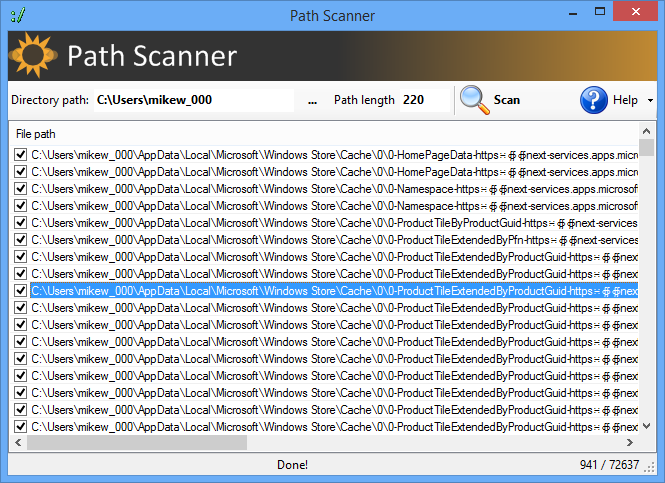Path Scanner searches your specified path and reports files whose folder and file names are greater than a defined length.
This enables you to locate paths which are approaching 255 characters, a limit for many programs. For example, you won't be able to copy a file in Windows Explorer if the destination path and file name combined are 256 characters or longer.
The program launched with a default path of D:\ on our test system, for some reason (this was an empty DVD drive). It's easy to type or browse to whatever other folder you like, though. We chose a maximum path length of 220, clicked Scan, and the results were listed within a few seconds.
The list of problem files may be exported to CSV for analysis later (right-click > Select All > right-click > Export to CSV).
There's also a right-click "Analyze" function which looks like it's supposed to help you rename or delete selected files. It's less than intuitive, though, and also warns that it's in "beta" and using it is at your "own risk", so we decided to leave it alone.
Path Scanner requires installation, which is a shame - it's very basic, and should be portable by default. But it doesn't include any adware or system components, and we were able to install it, copy the pathscan.exe file and immediately run it on other systems.
Verdict:
Path Scanner has some design quirks, and hasn't been updated in years, but it's still a straightforward way to identify potentially troublesome paths on your PC.





Your Comments & Opinion
Share your photos and video on a visual social network
Copy file paths to the clipboard in many formats
Easily view and edit your PATH environment variable
Extend your command line capabilities with this powerful cmd.exe replacemen
Bring the Windows command line right up to date with this powerful tool
Uninstall multiple programs - silently - with a click
A complete clean-up, maintenance and optimisation toolkit for your computer
Give your system a speed boost by cleansing and optimising your PC